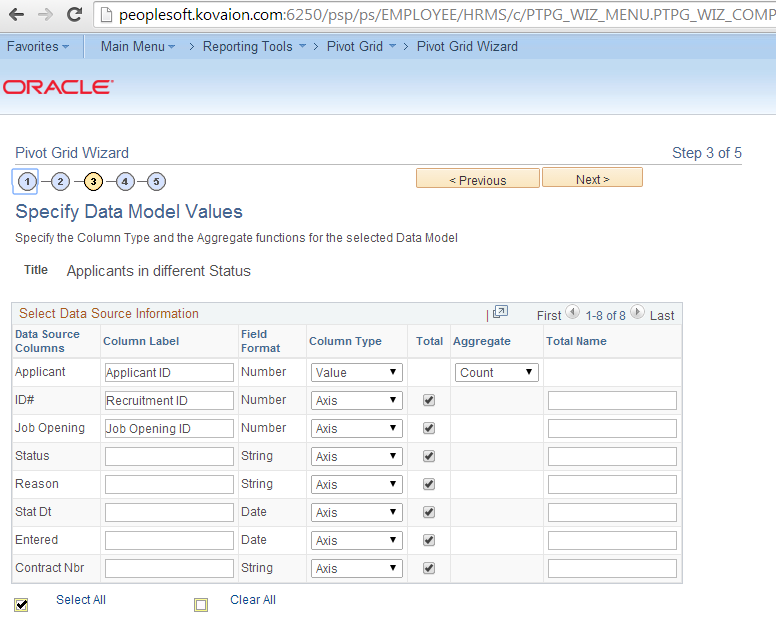The PeopleSoft Pivot Grid is a reporting tool used to provide a pivot table and chart representation of live data using PS Query data source. This enables users to visually display data in a dashboard. Data can be displayed in different views by performing operations such as pivoting and filtering, which enables business analysts to interpret data in a variety of ways.
Business Benefits:
- Pivot grids can be published as
pagelets, so can be published on home page or any other navigation.
2.
Users
can take action directly from the chart/report. - Related Content can be
configured in Pivot grid.
3.
Drilling
Down on the Aggregate Values
The detailed
view displays the complete data of the grid and Actions dropdown helps navigate
to related links or action can be taken.
4.
Inter
Window Communication: Pivot Grid Pagelets can interact with each other and with
the transaction pages. Configure Publication and Subscription with all the
intersecting Prompt and Filter values between Pivot grids. We get the
consistent behavior with progressive filtering in the publisher and subscriber.
5.
Pivot
grids can be published as Related Content on any of the components, so that the
user can refer them easily.
6.
Displaying
Grid from Chart-only view - Display the grid from a chart-only view and
then perform various actions such as pivoting data, dragging and dropping, and
slicing and filtering data to change the grid layout. After the layout is
satisfactory, you can synchronize the chart with the grid view.
7.
View
grid option allows user to display the results of the query in grid format and
filters can be applied.
8.
PeopleSoft
Pivot Grids allow the user to analyze data within the PeopleSoft
application. The advantage here is that, as we all know, initial data
analysis often leads to more questions and a need for deeper analysis. PeopleSoft
Pivot Grids allow the user to dive deeper, all the way down to the
transactional level into the system to grab more data for the desktop
spreadsheet. It is cleaner, easier and more efficient.
9.
Pivot
Grids allow the user in a specific job role to focus on the
activities that are most important to their specific job requirements.
The user is able to immediately access the most Relevant information for their
role. Information is easily prioritized and action lists can be created.
Development Process
Pivot grid
can be developed in five easy steps:
Navigation: Main Menu -> Reporting Tools
-> Pivot Grid -> Pivot Grid Wizard.
Step1:
Provide pivot grid basic details - grid name, title and type.
Step 2:
Provide data source type and PS Query name.
Step 3:
Provide data model values. At least one value and axis for the column should be
specified.
Along with
at least one value and axis specifying for the columns.
Step 4:
Provide X and Y axis and filters.
Specify data
model options providing X and Y Axis and specify filtering in fourth step.
Step 5:
Verify the pivot grid, publish it as pagelets or related content.
Limitations
on Pivot Grid:
- Supports only PS Query as data
source.
- Pivot Grid Does not have a
Vertical Scroll bar for viewing data, but it displays all possible rows
based on the current layout.











No comments:
Post a Comment